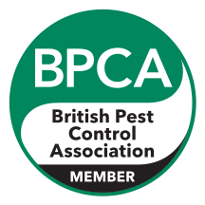Welcome to Cockroach Control Chelmsford We can help with all your Cockroach Control Problems.
Pest Control Chelmsford are committed to providing a Cockroach Control and prevention service in Chelmsford which is efficient, dependable and a safe working environment for our customer whilst complying with legislative requirements.
We have gained many customers through recommendations over the years, both from the commercial and domestic market.
St George’s Pest Control Ltd is a member of the BPCA (British Pest Control Association) and has several accreditations including CHAS, Constructionline, Safecontractor, CSCS and have been approved by the Essex County Council – Buy with Confidence scheme.
For all your Cockroach Problems and for a Cockroach Control Quote please contact us on 01245 327 274
Cockroaches
The two most common species of cockroach are the German Cockroach and the Oriental Cockroach.
The adult German Cockroach is 10 to 15mm long, brown in colour with two distinctive stripes and long wings overlapping it body (male and female).
The Oriental Cockroach is larger at 20 to 24mm long, dark brown-almost black in colour with wings that cover two-thirds of its abdomen (male); the wings are underdeveloped on the female.
Both species thrive around the heating ducts and boiler rooms of large centrally heated buildings e.g. hospitals, bakeries, hotel and restaurant kitchens, laundries and blocks of flats. They cluster around pipes, stoves and sinks, especially in humid areas.
The German cockroach carries its egg case (a small brown capsule) until the 30 or more nymphs are ready to hatch from it. The Oriental cockroach deposits its 13mm long egg capsule on packaging, sacking or in suitable dark crevices before the 16 or 18 nymphs hatch out.
Cockroaches grow in stages – the German cockroach grows from nymph to maturity in 6 to 12 weeks, the Oriental cockroach takes much longer to reach maturity, from nymph to adult in 6 to 12 months depending on heat, humidity and food availability.
Both species are most active after dark. Cockroaches venture out from their dark crevices and harbourages, foraging around for any sort of food. They contaminate food and food utensils and food preparation surfaces as they go. They taint food and may be carriers of various diseases, including serious food poisoning.
Treatment:
A cockroach infestation is not easy to control due to the cockroaches hiding in inaccessible crevices. An application of a residual insecticide is applied to all kitchen cupboards, behind fridges and freezers, under kitchen units etc, including insecticide gel bait applied into gaps in tiles, around pipes and any harbourages.
Two or more treatments may be necessary as no insecticide can kill the egg stage of the life cycle. The residual insecticide remains active for 6 to 8 weeks, once the nymphs have hatched, they will be killed off when they come into contact with the insecticide.






